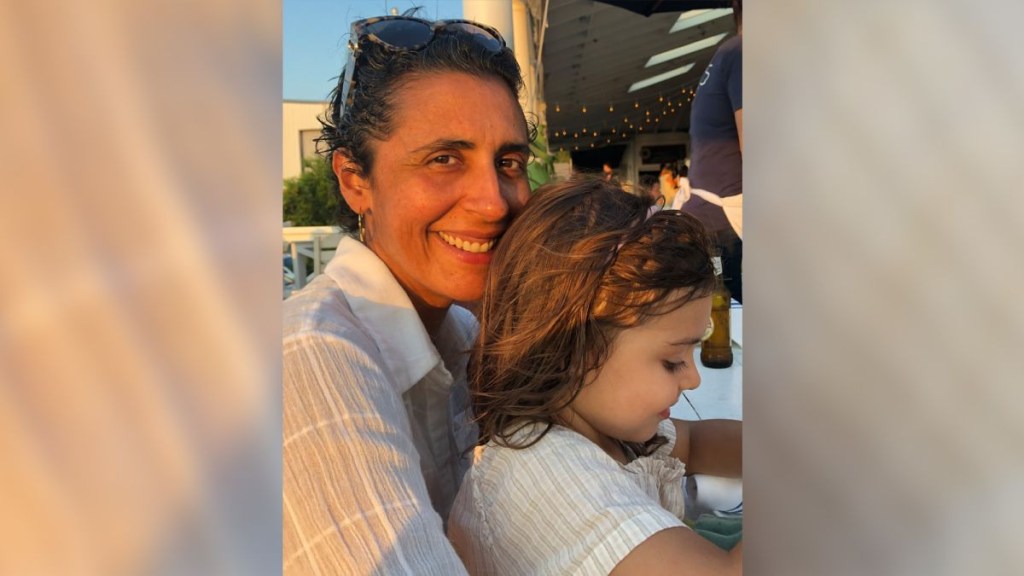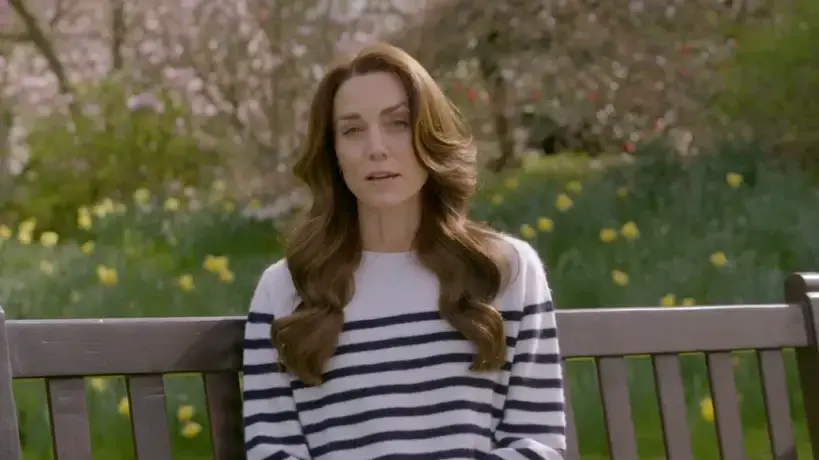Cancer cases grow in adults under 50 years old 0:48
(CNN) --
Iana dos Reis Nunes was 43 when she told her husband that she felt something like a bubble in her abdomen when she lay on her side.
An ultrasound detected spots on her liver, prompting her to have blood tests and a colonoscopy.
"There was a tumor the size of a fist, and she had no pain or trouble passing stool or anything like that," recalls Brendan Higgins, her husband, who works as an artist in New York.
By the time doctors discovered it, dos Reis Nunes' colon cancer had spread.
He was in phase 4, which means that it had reached other parts of his body.
The family did not even know where the blow had come from.
"She had had a baby 15 months before her diagnosis, so she had had a million blood tests, you know, doctor's attention and ultrasounds... and there was no sign of anything, nothing at all."
advertising
When cancer strikes an adult younger than 50, doctors call it an early-onset case.
These cancers at younger ages are becoming more frequent.
Iana dos Reis Nunes was 43 years old when she was diagnosed with colon cancer.
Credit: Brendan Higgins
A new review of cancer registries from 44 countries has revealed that the incidence of early-onset cancers is rising rapidly for colorectal cancer and 13 other cancers, many of which affect the digestive system, and this increase is occurring in many high- and middle-income countries.
The study authors say the increase in young adults is due in part to more sensitive screening tests for some types of cancer, such as thyroid cancer.
But the evidence doesn't fully explain the trend, says co-author Shuji Ogino, a professor of pathology at the Harvard TH Chan School of Public Health.
Colorectal Cancer: Half of New Diagnoses Are in People 66 and Younger, Report Says
Ogino says the uptick is due to a mix of risk factors likely working together, some known and others that need to be investigated.
Ogino also points out that many of these risks have established links to cancer, including obesity, inactivity, diabetes, alcohol, smoking, air pollution, and Western diets high in red meat and added sugars, not to mention the shift work and lack of sleep.
"And there are also many unknown risk factors, such as a contaminant or food additives. Nobody knows," he says.
Ogino believes that the fact that so many of these cancers -- eight of the 14 studied -- affect the digestive system points to an important role for diet and the bacteria that live in our gut, called the microbiome.
"I think this is really an important element, because what it points to is the change in the prevalence of exposure at younger ages, which is leading to earlier-onset cancers," says Dr. Elizabeth Platz, an epidemiologist at the School of Health. Public Bloomberg of Johns Hopkins University, who also edits the journal Cancer Epidemiology, Biomarkers & Prevention, and who was not involved in the review.
For example, obesity.
Before it was rare.
Not only has it become more common to have a dangerously high body mass index, but people become obese at a younger age, even in childhood, so these cancer risks are accumulating decades earlier than generations previous.
An explosion of colorectal cancer in young adults
The rise in early-onset colorectal cancer, the cancer that afflicted two Reis Nunes, has been especially pronounced.
Ogino's review found that over the years of the study, the average annual increase in colorectal cancer in young adults was about 2% in the US, Australia, Canada, France and Japan.
In the UK, it is almost 3% per year in England, Scotland and Wales.
In Korea and Ecuador, it is about 5% per year.
"It doesn't sound big, but you have to think about inflation: if it's 2% every year, it's going to be a big change in 10 or 20 years, you know?"
said Ogino.
"It's not something trivial."
Between 1988 and 2015, those annual spikes pushed rates of early colorectal cancers from nearly 8 per 100,000 people to nearly 13 per 100,000, a 63% increase, according to another recent review published in The New England Journal of Medicine.
Studies show that about 1 in 10 colorectal cancers in the US are diagnosed in people between the ages of 20 and 50.
The younger you are, the greater the risk
Ogino's review found what is called a cohort effect, meaning that the risk of early-onset cancer has increased in each successive group of people born at a later time.
Those born in the 1990s have a higher risk of developing cancer early in life than those born in the 1980s, for example.
Other malignancies that are increasing in younger Americans include those of the breast, endometrium, gallbladder and bile ducts, kidney, pancreas, thyroid, stomach, and blood plasma cells, a cancer called myeloma.
Dr. Karen Knudson, CEO of the American Cancer Society, calls the review a "wake-up call."
Cancer is a serious diagnosis at any age, but when it appears in young adults, the tumors are often more aggressive, often going undetected longer because routine cancer screening tests are not recommended for some of the most common cancers. common, such as breast and prostate, up to 50 years.
"Not only are these early-onset cancers more likely to be diagnosed when the tumor is at a more advanced stage, they were also, in some of the reports tabulated here, associated with a worse survival outcome," Knudson said.
Study: Colonoscopy could reduce cancer deaths by 50% 1:07
It is no longer a disease of the elderly
Dos Reis Nunes began treatment in 2017 at Sloan Kettering and Mount Sinai cancer centers in New York.
Her husband recalls that the doctors explained to him that she was one of the increasingly younger patients they had registered.
"I remember it was a point of contention at both hospitals that people getting colon cancer were getting younger, younger and older, and they couldn't explain it," Higgins said.
Higgins says she spent a lot of time in online support groups, looking for answers and comfort.
"And there were a lot of young people in those groups," he said.
"It wasn't populated by people in their 50s and 60s. They were 30-somethings, 40-somethings, 50-somethings. So I was very aware that this was no longer a disease of the elderly," he said.
In fact, routine screening, with colonoscopies and tests to check for blood in the stool, has reduced colorectal cancer cases and made it less deadly in older adults, although cases have skyrocketed in those under 50 years.
Knudson says that three things should happen in the wake of comprehensive and definitive reviews like this one.
"First of all, there should be a call for research to really understand some of the specific trends that we're seeing," he says.
Second, he wants to increase risk awareness, which will hopefully help people modify their behavior to control their risks as much as possible.
Third, he says, groups recommending cancer screening should reevaluate when screening should begin.
It could be that some should start at younger ages.
In fact, that is already happening.
Last year, the rising incidence of colon cancer in young adults prompted the US Preventive Services Task Force to lower the recommended age for doctors to start screening for colon cancer to 45 .
"If you're about to hit 45, you should think about this and not wait until you're 50 or 55," Higgins said.
Higgins added that his wife's first 12 months of cancer treatment were almost miraculous, "she had a remarkable reaction to chemotherapy."
"And then I read about this actually, it can come crashing down very quickly," he said.
"And once it started going down, it just went downhill extremely fast."
His wife died in 2019, leaving behind their daughter, Maeve, who was not yet 4 years old, an 11-year-old boy and a 20-year-old boy.
"We had a great love story," he said.
"I'm still bitter. I'm still angry."
"Life is fine. Everyone is fine. But deep down, it boils me that it happened to her. She was a very good person."
Cancer






